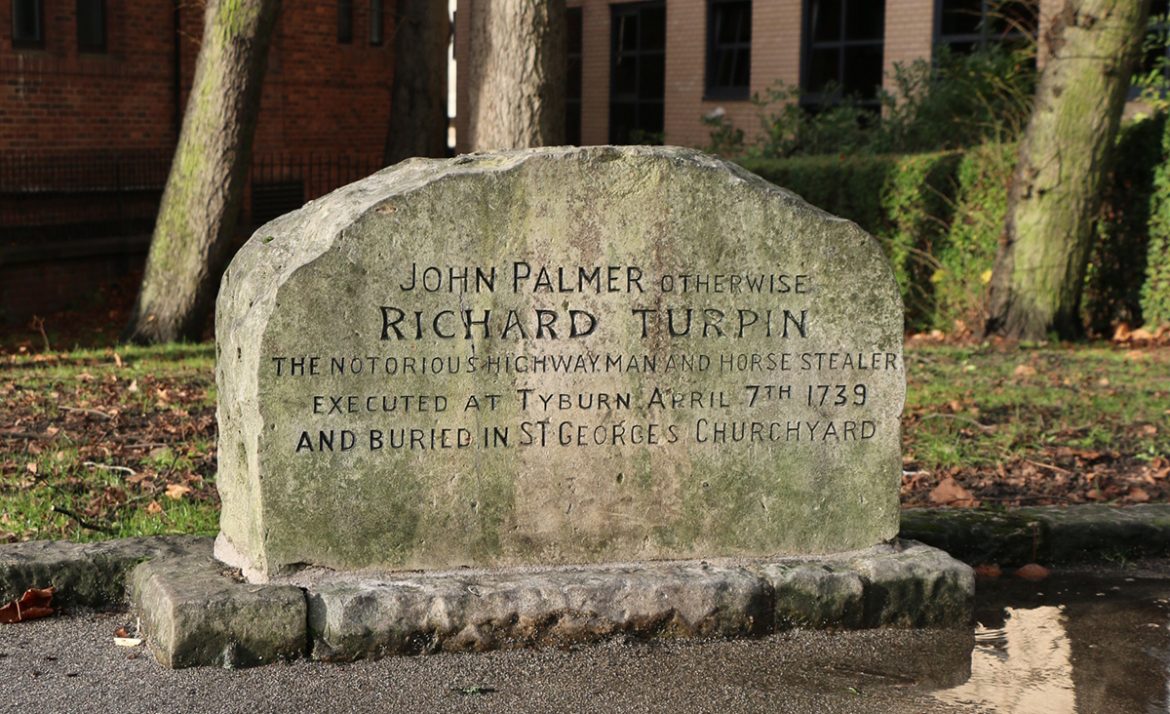Whether you consider him a highwayman of legend, or a low-down thief and murderer, there is no question that Dick Turpin is world famous.
For someone of such international infamy, his last resting place is unremarkable. A scuffed square of stone in the easily missed St George’s Churchyard on George Street, his grave is marked by a headstone dedicated to “John Palmer otherwise Richard Turpin, the notorious highwayman and horse stealer”.
It’s pretty large – but then legend has it Turpin was buried with his horse Black Bess (although in reality he never owned a horse of that name).
Now there are plans to spruce up the churchyard. Charity York Cares is sending in a team of volunteers to trim hedges, add new fencing, lay a path around the graveyard and install an information board.
But there’s quite a large question mark as to whether dastardly Dick is even under his tombstone…
What we do know
Essex-born Dick Turpin was a member of a violent gang of thieves. He became a highwayman when the others were arrested and, as the authorities closed in on him, shot a man dead in Epping Forest in 1737.
He fled to Yorkshire under the assumed name John Palmer, and was imprisoned at Beverley for shooting a man’s cockerel in October 1738.
Turpin was transferred to York Castle jail when evidence emerged linking him to the more serious crime of stealing horses.
At the end of March 1739 he was tried at York Assizes, convicted and condemned to death.
Jail and execution
According to Katherine Prior, researched the York Castle Prison project for the Castle Museum in 2009, jail wasn’t all bad for Dick.
“In the daytime he could receive visitors, and many of his acquaintances from his months of living in Yorkshire, along with the generally curious, came to see him.
“Either he or they purchased a good deal of wine from the gaoler – Thomas Griffith – to lubricate their visits, as it was said that the gaoler made £100 from such sales.”
He brought a frockcoat and shoes to look stylish for his execution. On Saturday, April 7, 1739, he was taken from the jail to the gallows at Knavesmire.
He paid five mourners to follow his cart and chatted calmly to his executioner for half an hour. Then he threw himself off the ladder and was dead within five minutes.
Where did the body go?
After Turpin’s body was cut down, it was laid out in the Blue Boar in Castlegate, where it attracted a crowd of curious onlookers.
Then, as preeminent Turpin scholar and York University professor James Sharpe recounts in his book Dick Turpin: The Myth of the English Highwayman: “At ten the next morning, Sunday 8 April, the body was buried ‘in a neat coffin in St George’s churchyard, within Fishergate postern’.
“Turpin had spent his three pounds ten shillings well, for ‘the grave was dug very deep, and the persons whom he appointed his mourners… took all possible care to secure the body’.”
But he didn’t rest in peace. Surgeons needed bodies for dissection classes and would regularly try to obtain the corpses of criminals for the purpose.
At 3am on the morning after the burial, some people were discovered moving Turpin’s body. But an angry mob chased after them and recovered it from a “garden house”. According to a contemporary pamphlet, they
“brought away the body through the streets of the city, in a sort of triumph, almost naked, being only laid on a board cover’d with some straw, and carried on four men’s shoulders, and buried in the same grave, having filled the coffin with slack’d [ie slaked] lime”.
In his book, Prof Sharpe reveals that city surgeon Marmaduke Palms was bound over at York Assizes for “causing to be taken up the body of Richard Turpin out of his grave”.
So is he under that gravestone?
[envira-gallery id=”46715″]
Cans next to Turpin’s grave, and St George’s churchyard. Click to see a bigger image
“The short answer is that Turpin was buried in St George’s churchyard, but that it’s very implausible that where the current gravestone is actually marks the location of his original grave,” Prof Sharpe told YorkMix.
Why? “Because 1) the gravestone is fairly modern, and 2) the other gravestones in the graveyard all date from significantly later than Turpin’s death.”
“I’m anyway rather unconvinced that an executed felon would have had a marked grave in the 18th century, unless they were extremely upper class.”
He guesses that the current tombstone dates from the early 20th century.
Prof Sharpe says a “project for his retirement” is to research York newspapers from the time to look for reports on the marking of his grave, “which would help us understand the rationale of why it was decided to place the stone where it is (and, indeed, why they decided to mark the grave at all)”.
Unless someone else wants to take up this project sooner…?
And until then, remember that Turpin rides again every time there’s a race meeting at his place of execution, Knavesmire, as YorkMix‘s legendary (or should that be notorious) racing tipster…
